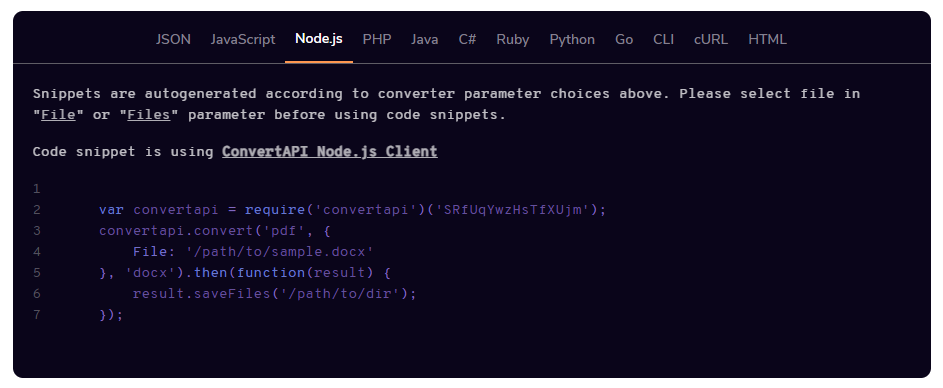Many progressive web apps nowadays are built using a serverless architecture where complex computations and machine resources are hosted by a third-party service, eliminating the need for server software and hardware management by the developer. ConvertAPI is a cloud-based, platform-independent service that handles document processing on demand. It allows you to convert images, MS office documents, ebooks, emails, web pages to PDF as well as merge, encrypt, compress, and apply multiple advanced operations to the final PDF document. In this example, we will see how simple it is to integrate it to our NodeJs project.
The workflow
In this quick demo we want to generate a PDF document that has a static cover page and a dynamic body, that can be anything from .docx, .xlsx, .pptx, images, text to even web pages that we'll convert to PDF and merge it with our pre-made title page. Later on, we will be able to compress, rotate, encrypt, archive the generated document as needed.
Let's begin
First, let's create a directory for our project and add a file called convertapi-nodejs.js. For this project to work on your environment you will need NodeJs installed. Then, let's add a ConvertAPI NodeJS library using npm:
npm install convertapi --save
Now let's create a folder inside our project's root directory called "files", and put our documents there. You can also convert files by passing a file URL if the file is hosted on a server (for more information about file upload options please refer to our docs). In our example, we will place two files into the "Files" folder and convert from there. Let's add our styled cover page called "first-page.pdf" and a sample DOCX file that will appear as our PDF's content called "sample.docx". So our "Files" folder looks something like this:

We will apply our first DOCX -> PDF conversion (you don't need to have MS Office installed on your machine to make this conversion). Simply put this code snippet inside the convertapi-nodejs.js file:
var convertapi = require('convertapi')('your-api-secret'); convertapi.convert('pdf', { File: './files/sample.docx' }, 'docx').then(function(result) { result.saveFiles('./files/document-body.pdf'); });
Replace 'your-api-secret' string with your secret key and it will run the conversion immediately once we run the node convertapi-node.js command from CMD.
Secondly, let's merge our styled cover page with the converted DOCX file into a single PDF using the PDF -> MERGE conversion. Our extended method will look like this:
var convertapi = require('convertapi')('your-api-secret'); convertapi.convert('pdf', { File: './files/sample.docx', }).then(function(result) { return result.file.save('./files/document-body.pdf'); }).then(function(file) { convertapi.convert('merge', { Files: ['./files/first-page.pdf', file] }, 'pdf').then(function(mergedResult) { mergedResult.file.save('./files/result.pdf'); }); }).catch(function(e) { console.error(e.toString()); });
That's it, we have converted a DOCX file to PDF and then merged it with our cover page programmatically using NodeJs. You can apply further conversions like PDF Compress, PDF Encrypt, archive PDF to PDF/A, generate a thumbnail preview and so on in the same manner. To get the most performance benefits you can chain multiple conversions using conversion workflows. You can find a complete list of conversion parameters under conversions section. Simply select your conversion and you will see an interactive demo with all available parameters for the conversion. Don't forget to grab the auto-generated code snippet at the bottom!


